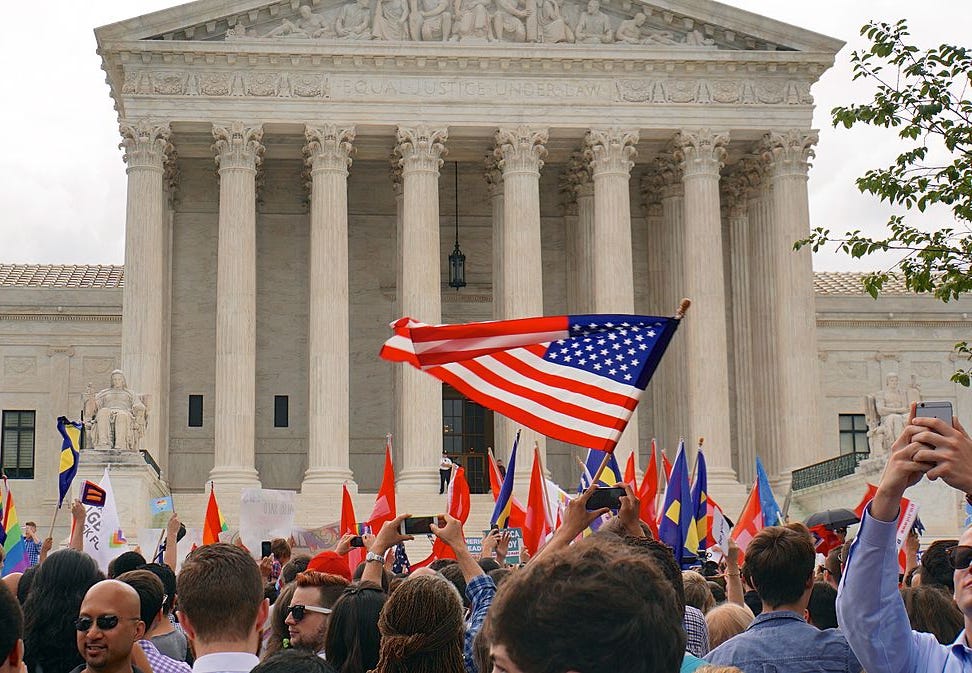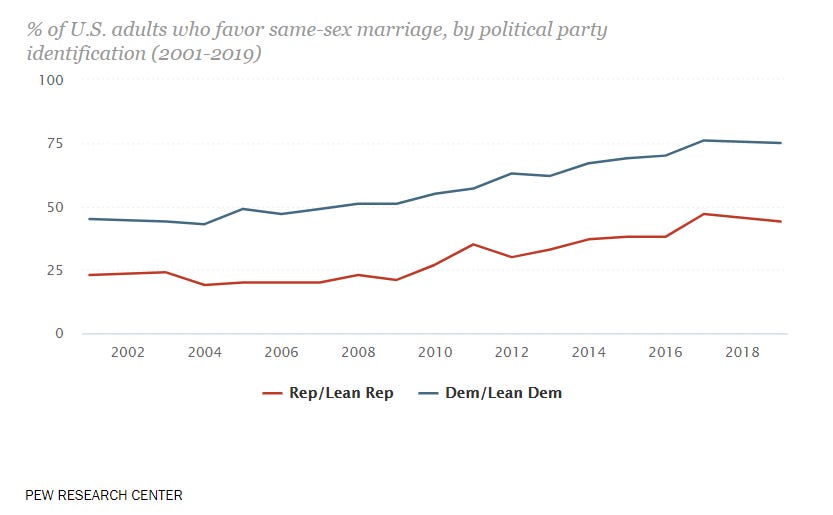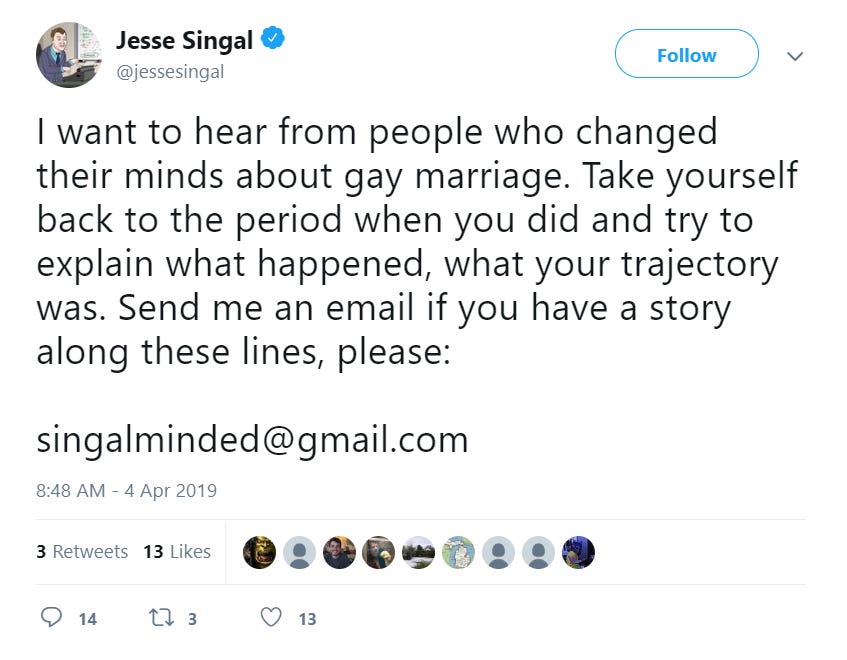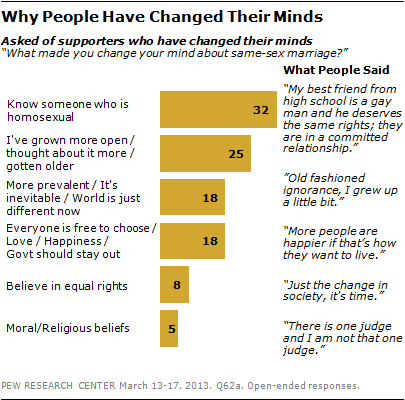
A Very Brief Reminder To Subscribe To My Podcast
Singal-Minded Conversations is hosted here and is available via Apple Podcasts, Google Play, Spotify, Stitcher, TuneIn, or your other podcatcher of choice. If you need an RSS feed, use here you go. There have been four episodes so far:
-Psychologist Katie Gordon on youth suicide and the perhaps-overhyped campus-culture wars.
Please subscribe! If you are interested in this newsletter, I think you will enjoy these conversations.
Also oh hey look at this it’s an opportunity to become a paid subscriber to this newsletter:
Why Some Americans Changed Their Minds On Gay Marriage
I’m fascinated by the question of why people change their minds on hot-button political issues. And there’s probably no hot-button political issue where there has been a bigger change in public opinion in a shorter period of time than gay marriage. Since the turn of the millenium, according to the Pew Research Center, liberal support for gay marriage has jumped about 30 percentage points, while conservative support for it has jumped about 20:

Early in April, I posted a few tweets like this one, soliciting stories from people whose minds on this subject had changed:

I’m going to devote the rest of today’s newsletters to a handful of these stories — I couldn’t include all of them, but thank you to everyone who wrote in. Before continuing, though, I should note that I also got an email from Carroll Doherty, Director of Political Research at Pew, who pointed me to some polling her organization had done on exactly this question: As of 2013, she explained, about 28% of gay-marriage supporters were ‘converts,’ and the most common reason they listed was simply knowing someone who is gay:

This jibes with my general understanding of the relevant political and social psychology here. Overall, I think people are much more swayed by emotional, gut-level factors having to do with family and identity and values than by rational arguments. Maybe that’s part of the reason irrational arguments can survive for so long — they’re fueled by other stuff. (To be clear, I still think we need rational arguments for a variety of reasons.)
Originally I was going to try to provide some sort of analysis or commentary or whatever pertaining to the below stories, but on the other hand: meh. I think they’re interesting in a standalone kind of way. If they stir any strong feelings in you, shoot me an email at singalminded@gmail.com and maybe I’ll follow up in a future newsletter — I’m overdue for a mailbag, anyway.
Enjoy, and thanks again to my correspondents, including the ones whose emails I wasn’t able to include.
Elliot:
I was raised (and still am) a personally conservative Latter-day Saint. (Mormon, but we're trying to move away from the term.)
After my mission I went to the University of Missouri and started thinking about the secular world again after being absent from it for two years. I became more concerned with making sure that those who share my faith can continue to worship unmolested into the future in a world where mainstream values are trending away from our own. I had previously been voting against gaymarriage because I saw it as a government attempt to meddle in a private matter. I came to realize that if I wanted full liberty for me and my brothers and sisters to do as we please I had to accord it to others also. Eventually I realized that it was government meddling (and discrimination) to prevent people from being able to proclaim their relationship to be a formal marriage.
So my mind-change started out from concern for my faith's preservation (call it a persecution complex if you will, I probably just overthought things back then). I later became libertarian and now I'm politically voluntaryist so it's past simply preserving my faith and more about what's ethically correct, but that wasn't how it started.
Josh:
When I was younger, I believed gays should be able to get civil unions, but not be allowed to adopt. I began reversing my opinions in my late teens.
I was born into a Catholic family, and while the church I attended never taught or expressed any homophobia, there seemed to be a tacit understanding that gays were *icky*. This was confirmed by ‘flamboyant’ and ‘lewd’ behavior of highly visible gays in movies, news, etc.
Through HS and college, I began meeting and becoming friends with more gay people and realized my bias about gays being icky and lewd was the result of horrible miscalibration. Took me a day of self-reflection to realize, actually, I was the idiot. I support gay rights depite the fact most of my politics still remain fairly right-of-center
Andrew:
I can answer your question if my first name only will suffice. While I hate labels, my voting record would suggest I am reliably left of center. I have never voted for a Republican candidate for president and, while I am always looking for worthy local and state Republicans to vote for, have ended up voting for only a few.
I wanted gay and lesbian couples to have all legal rights conferred by marriage, including whatever next-of-kin rights apply in healthcare situations. But I didn't see what was so important about calling it “marriage.” Didn't the non-gay-marriage-advocating rest of the world kind of get there first? What would be so terrible with letting them retain the meaning they invented and have used for a very long time as one man, one woman? Insisting that it be marriage seemed unnecessarily in-your-face when they could have all of the rights accorded to married couples through some sort of civil union structure.
My mind changed abruptly when I saw a television news report of many gay couples getting married in a state that had just legalized the practice. They were skipping and hugging and literally crying with joy.
At that moment I just thought, “Oh. Well, fine, then.” Seeing how much it meant to them was enough for me to unreservedly support gay marriage ever since.
MS:
I’m a liberal who has always supported gay rights, but I was living in SF in late nineties, and was wary of gay marriage for two reasons:
Political - felt like domestic partnership was fine, and that gay marriage was a political can of worms that didn't need to be opened. I now feel this was wrong, but back then some gay people also felt this way - “we’re doing ok, don't need to go there, it will cause problems.”
Personal - I felt that understanding who you are is hard enough in the world, and that there are “norms”, and there are “outside the norms”, and that it's ok to be/be seen as outside the norm as long as you're not getting discriminated against for it. “Norms” are necessary for humans to understand and define themselves, especially because for some people, having norms to define themselves against is important. I had teenagers in my mind as I thought of this - hard enough to figure out who you are without normalizing more options and thus making life seem even more confusing. (I’m an indecisive introvert myself, overthink things a bit sometimes, you may be able to see.)
Although the 2004 election seemed to confirm my political fears, by 2006 or so, I started to know that my stance just didn't make sense, that what I was supporting was “separate but equal” marriage, which of course cannot stand. But the moment when I shifted whole-heartedly was the viral video of the San Diego mayor at the time (Sanders) holding a press conference to state his own change of heart. I needed that visceral human experience (via video!) to relate to - at that point I completely shifted to 100% support for gay marriage.
Abigail:
I was living in Southern California in 8th grade when Prop 22 was passed. At 13, I was on the cusp: still holding on to many beliefs that had been spoon fed to me by my parents, many of which was wrapped up in Christian traditionalism. I acutely remember standing in a circle with my friends in the school courtyard before the first bell, discussing the passing of 22 and what it meant. I was one of the girls who said, Of course marriage should be between a man and woman. But a couple of my friends weren't so certain. One of them asked, why shouldn't they get married? What's the harm?
Despite how I'd been raised, I had already begun to cultivate a sincere respect for rationality. I couldn't answer that question without resorting to some unreasoned dictate I'd heard as a child from my mother and her church. Within the week my beliefs about gay marriage crumbled, and I’ve been a supporter ever since. [...]
Kevin:
Here is my (boring) answer to your question to people who changed their mind about gay marriage...
I don't exactly know why/when I changed my mind about gay marriage. All I recall is that my view changed from “why should gay people be allowed to get married?” in the late-90’s to “why shouldn't gay people be allowed to get married?” by the mid-00's. I don't recall there being anything specific that changed my mind. It just kinda happened.
Of course, because I was already fairly progressive when it came to gay rights by the 90’s, accepting gay marriage wasn't a huge step for me. I had no religious reasons to be against it. Mainly, I think it just seemed to be unnecessary.
Assuming you will be writing an article about this, I look forward to seeing how similar/different my story is to the stories from others...especially from folks in my “Gen X” age group who grew up in a time when gay slurs were thrown around a lot more than they are now.
Jesse:
My name is also Jesse, so I feel an unjustified connection.
On the subject of gay marriage, I was raised a conservative Christian, and the heavy indoctrination that came with that was hard to overcome, at first. I was unable to reconcile this perspective with the overwhelming outpouring of emotions from gay friends and family members, so there was a great degree of friction and cognitive dissonance to work through.
Once I left Christianity, these ideas were much easier to work through in an honest way, and I more or less instantly disavowed all of my past justifications for disagreeing with gay marriage.
One particularly powerful argument that I still remember was when a gay friend asked me, “When did you decide you were straight?” Realizing I had never made an active decision helped me grasp the concept of gay people having been born that way.
Rob:
I started out vaguely anti same sex marriage. For context I graduated HS in 2000 and grew up in a Catholic family in the midwest. I wasn't something I had thought about, I just picked it up via the culture at the time.
As I got a little older and started thinking for myself I was pro gay rights but still anti gay marriage for what seemed like good reasons at the time. Around that time civil unions came out which extended most legal rights of married couples which I thought was a good compromise. I thought the marriage thing was an attempt to force businesses like insurance companies to provide services they didn't want to.
At some point, and I don't remember exactly when or why my mind changed but it was before the Supreme Court told everyone to STFU and let same sex marriages happen, I realized pretty much all the business activity I was worried about (particularly insurance) is related to regulation anyway so there really isn't any civil liberties case against it so it had to be supported.
On a somewhat related note I'm still very pro right of refusal. But just because someone has the right to refuse doesn't mean it's moral or ethical. I just don't understand why you would force those people to interact with you. Why try to force the bigot to make the cake? Or the church teaching hate to marry you? Don't support them or give them money. Take your support elsewhere and help someone more deserving survive.
Peter:
Since you asked on Twitter, I thought I'd respond: I changed my mind on gay marriage. Here's how that looked.
I grew up in a fairly conservative Christian home. Not “getting beaten with a switch if I didn't say my prayers enough” conservative, but then again, I think that's mostly caricature. My parents are both scientists and were very involved in the church. I was rebellious in general, but maintained a very good relationship with my family as I grew up and left home.
So it wasn't very surprising that I had similar beliefs as them on topics like gay marriage. That it should not be legal was never something I really considered, nor was it a particularly hot topic when I was young. (I'm 44 now, for reference.) The basis for that belief was that homosexual acts were wrong, and that the government was under no compulsion to change a millennia-old definition of marriage to support those acts. In my mind, the person that felt he was homosexual was not any more or less sinful than others who felt attraction to sinful acts, but he was called to a life of celibacy in response to those feelings. I went years without even questioning this belief since, again, I wasn't really being challenged to question it.
About eight years ago, I was sitting in a bar with a Christian friend of mine, and we were waiting for the third in our party to arrive. We started talking through many topics about the intersection of Christianity and modern life. We touched on the idea of gay marriage, and I was surprised to hear that my Christian friend was in favor of legalizing it. We talked for a while, and despite the fact that my mind wasn't changed (and I still think he is wrong, as he's gone full bore into the identitarian movement), it started me thinking.
Over the following couple of years, I talked to a number of other close Christian friends, including my dad. He was becoming more and more alienated by the conservative movement, and was sick of the political skirmishes over nonsense. Ultimately, he and I came to a similar conclusion around the same time, and it's roughly the same place I am today: gays should be able to enter into legally-recognized civil unions that carry all of the same legal weight as marriage.
(There was some grumbling in the news back then about the idea of “civil unions” for gays being a second-class alternative to what heterosexuals get in “marriage”. Some of that is semantics, but since words do mean things, I’ve come to the conclusion that the government should ONLY deal in civil unions—gay, straight, or otherwise—and leave “marriage” to religious bodies.)
I still hold the same religious beliefs, but my political beliefs—i.e., how my religious beliefs play out in the public sector—have definitely changed. And it was entirely through small (usually one-on-one), intimate conversations with trusted friends and family members that I eventually changed my mind.
I don’t know if that helps, but I thought I’d offer it up. I'm available for any follow-up questions you might want to ask me.
David:
Probably late, but I thought I'd chime in. Like many people, my original views were shaped by my religious upbringing. In my case, it was as a Mormon kid. I'd accepted most of the standard religious arguments that it was against God’s will, look at Sodom, etc., so growing up I held your pretty standard conservative outlook that gay marriage was immoral, and pointless since they couldn't have any kids.
What changed was, as a young barely-18-year-old living in California, I watched the church organize and really push to ban gay marriage in the state, in the form of Prop 8. Quick history by my understanding - california performed some gay marriages for a while, it was banned with Prop 22 a while ago, before being declared unconstitutional by the state constitution in 2008. Then Prop 8 was rushed out in response, which would put the same language from Prop 22 that banned gay marriage into the state constitution rather than just the law.
It really didn’t sit well with me, because while I wasn’t some kind of pro-gay mormon rebel, I understood the concept of separation of church and state, and it felt like the church was pushing its values onto others. If I recall correctly, the church itself and mormon families in california were supposed to have contributed something like half the funding towards Prop 8 efforts, despite making up like 1% of the state. There's a documentary about the Mormon Church's involvement in Prop 8. I haven't seen it, but I'm sure it cites more exact figures.
Anyways, Prop 8 did end up narrowly passing, in the same voting cycle that we elected Obama and I believe started funding that now-failed high speed train project. For myself, I was already questioning the church, and watching the whole thing unfold was what pushed me over the edge and finally drove me to leave.
After I left, since I didn't buy the religious arguments anymore, I started examining the issue from a more secular perspective, and I couldn’t find any solid arguments not to allow them. Sure, they couldn't have kids, but we didn't ban infertile people from marrying and wouldn't dream of doing so. Same with older couples, etc. Without religious influence, and especially with what led to that lack of influence, the right position seemed obvious.
Thinking back through the years and writing it up was fun. Thanks for your time if you do end up reading it.
Questions? Comments? Arguments for the outlawing of straight marriage? I’m at singalminded@gmail.com, or on Twitter at @jessesingal. The lead image, of demonstrators in front of the Supreme Court, is from Wikimedia Commons.
